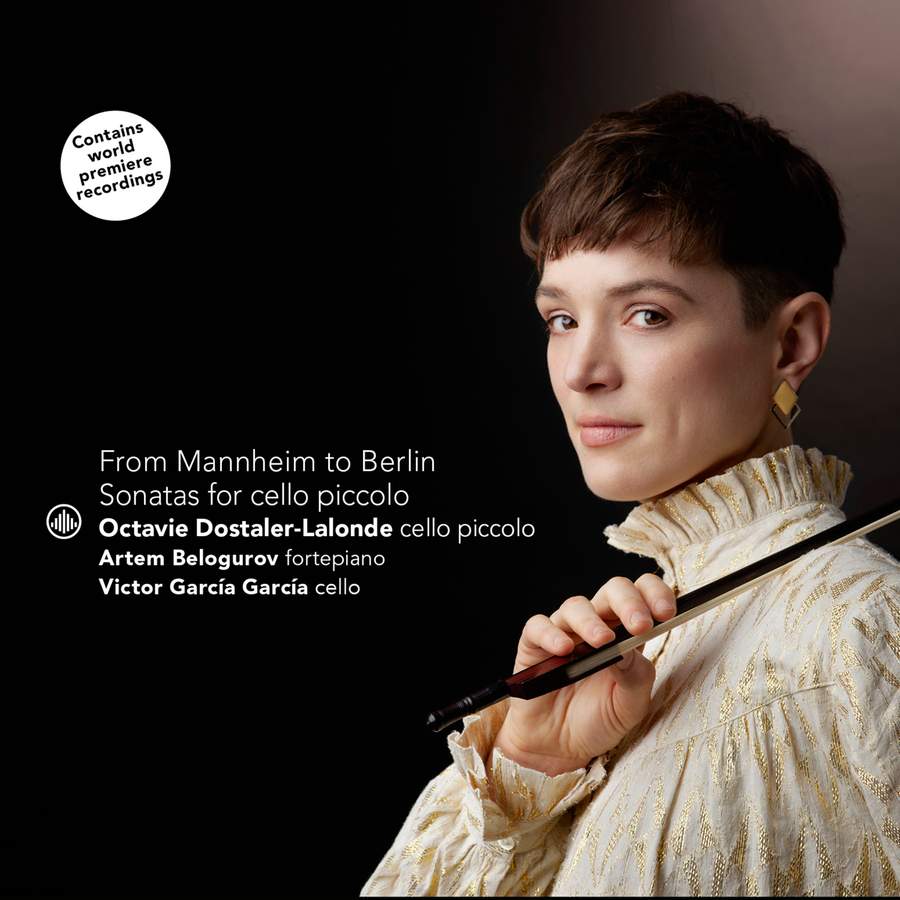From Mannheim to Berlin - Sonatas for Violoncello Piccolo
View record and artist detailsRecord and Artist Details
Genre:
Chamber
Label: Challenge Classics
Magazine Review Date: 10/2023
Media Format: CD or Download
Media Runtime: 70
Mastering:
DDD
Catalogue Number: CC72961

Tracks:
| Composition | Artist Credit |
|---|---|
| Duetto in C major |
Christoph Schaffrath, Composer
Artem Belogurov, Fortepiano Octavie Dostaler-Lalonde, Cello Piccolo Victor Garcia Garcia, Cello |
| Sonata for Cello and Keyboard |
Frantisek Benda, Composer
Artem Belogurov, Fortepiano Octavie Dostaler-Lalonde, Cello Piccolo Victor Garcia Garcia, Cello |
| Cello Sonata |
(Johann) Anton Fils, Composer
Artem Belogurov, Fortepiano Octavie Dostaler-Lalonde, Cello Piccolo Victor Garcia Garcia, Cello |
| Sonata in A major for Violoncello & Basso Continuo |
Johann Christoph Friedrich Bach, Composer
Artem Belogurov, Fortepiano Octavie Dostaler-Lalonde, Cello Piccolo Victor Garcia Garcia, Cello |
Author: Fabrice Fitch
This is simply lovely. The violoncello piccolo is slightly smaller than the normal instrument and tuned a fifth higher; the one played here (as far as I can tell) is a smaller 18th-century instrument that has been tuned that way rather than one explicitly designated as such – assuming the distinction is meaningful anyway. Not all the music recorded here was explicitly written for it, but the result is delightful, recognisably a cello but lighter, with an extraordinary, expressive cantabile up top and still plenty of body below. I assure you that it is worth hearing for itself, but this recital goes well beyond the attractiveness of curiosity.
Octavie Dostaler-Lalonde and her two accompanists deserve credit for assembling a repertoire thanks to which her instrument shines like a jewel. As she describes it, her selection is the result of much playing through with her accompanists, and I concur that everything here is worth hearing. Even if you’re not a fan of the galant period, the delicacy of her playing is astonishing, as any one of the slow movements demonstrates, but she’s just as convincing when boldness and agility are required, as in the sonata by Zyka – one of several composers I’d never heard of – or the concluding one by JCF Bach, the least known of Bach’s sons but a composer of real substance and more profound (to my mind) than his younger brother Johann Christian. Another highlight is the finale of Filtz’s sonata, a set of variations that set the instrument shimmering.
I mention the accompanists, and they are better described as collaborators: the Bach and the opening sonata by Schaffrath have obbligato keyboard parts, sometimes played on the harpsichord and sometimes on the fortepiano with uncovered hammers, or with a piece of felt between hammers and strings. For Zyka’s sonata, the role of bass is taken by the lower cellist without continuo, extemporising to fill in the texture. All this gives an idea of the loving attention to detail that has been lavished on the music; but after all the preparation, an air of extemporisation wafts over everything, down to the very last gesture on the disc, whose wit and charm (conjured up from nothing, or nearly so) sums it up perfectly. Any quibbles? Just one, then: a picture of this gem of an instrument wouldn’t have gone amiss. I’d love to write for it.
Discover the world's largest classical music catalogue with Presto Music.

Gramophone Digital Club
- Digital Edition
- Digital Archive
- Reviews Database
- Full website access
From £8.75 / month
Subscribe
Gramophone Full Club
- Print Edition
- Digital Edition
- Digital Archive
- Reviews Database
- Full website access
From £11.00 / month
Subscribe
If you are a library, university or other organisation that would be interested in an institutional subscription to Gramophone please click here for further information.




